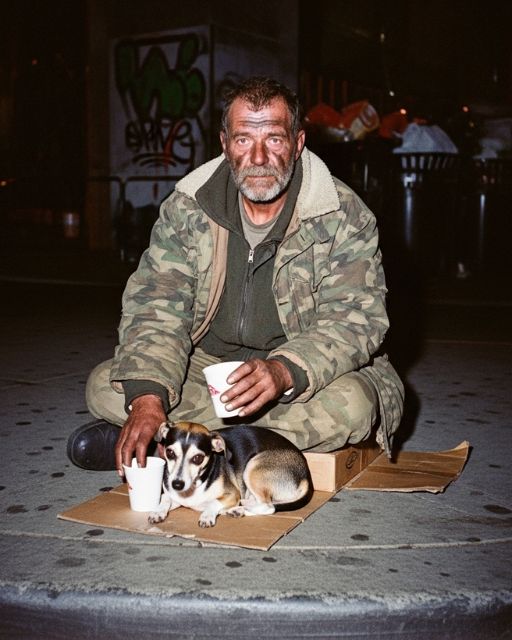I’ve been out here with Dibs for almost four years. He’s not just a dog—he’s the last thing I got from my brother before he overdosed. Everyone around here knows us. Some people hand us snacks. Some pretend we don’t exist. Whatever.
Last winter, though, it got brutally cold. Like, waking-up-with-ice-in-your-hair cold. A shelter van drove by, and the guy inside said, “We’ve got a cot for you. Hot meals. But no pets.”
I thanked him, but said no. Dibs and I were a package deal.
Then a woman—I never got her name—approached while I was packing up near the bridge. She wore a shiny coat, talked fast. Said she worked for a “placement organization,” whatever that meant. Promised she could board Dibs for free while I got back on my feet. He’d be warm, fed, and walked every day. She handed me a paper to sign. I hesitated. She smiled and asked, “Do you want him to freeze out here?”
I couldn’t say no.
I signed.
That was 11 weeks ago.
The number she gave me stopped working after five days. The “boarding facility” didn’t exist. No one had seen Dibs since.
I reported it to two outreach vans, a cop, and even the librarian on 8th Street who knew how to look things up. Nobody could find anything.
Then, two nights ago, I saw a flyer on a pole near the thrift store. A tiny picture of Dibs. A different name. “Available for adoption.”
And the address?
It was across town. A place called “Silver Paws Rescue.”
I couldn’t sleep that night. My stomach was in knots, partly from hunger, partly from pure rage. I knew it was him. The same little white spot on his chest. The same ear that droops like it’s trying to hear secrets from the ground.
I borrowed a phone from Sandy, an older woman who works nights at the shelter kitchen. We looked up Silver Paws. It was real. Fancy website. Happy dogs, clean kennels. “Strict adoption protocols.” It made me sick.
The next morning, I walked the entire way. Took me six hours. Blisters on both feet by the time I reached the gates. A woman behind the desk looked up when I walked in. Her eyes did that thing people’s eyes do when they try not to judge, but still do.
“Can I help you?” she asked, half-smiling.
I pointed to the flyer I had grabbed off the pole. “This dog,” I said. “His name is Dibs. He’s mine.”
She took the paper, squinted, then walked to a back room. I waited, heart pounding like a drum. When she came back, a man was with her. Balding, neatly trimmed beard, holding a clipboard like it gave him authority.
“We have no record of a previous owner,” he said defensively.
“I didn’t surrender him. A woman took him. Said she was from an organization. Promised to keep him safe.”
He nodded slowly, like he’d heard this before. “Do you have proof you owned the dog?”
I blinked. What proof? I’d never microchipped him. No vet bills. Even his collar was second-hand. What I had were four years of memories. Nights curled up under the train bridge. Morning licks on cold cheeks. A bark warning me when someone got too close in the dark.
“I have my word,” I said quietly. “And he’ll know me.”
The man’s eyes softened, but not enough. “Even if the dog recognizes you, we need legal ownership documents. We’ve already received an adoption application. He’s scheduled to go home tomorrow.”
That hit me like a punch to the chest. “You’re giving him away?”
“We don’t give dogs away,” the woman corrected. “There’s a screening process. The family is very reputable. Stable home. Fenced yard
I didn’t have a stable home. My yard was a patch of grass behind an abandoned lot. But none of that mattered to Dibs. He never asked for anything but belly rubs and old hot dogs.
“Can I at least see him?” I asked.
They hesitated, whispered to each other. Then the man said, “One minute. If he reacts like you say… we’ll talk.”
